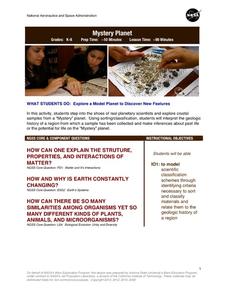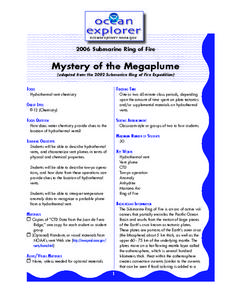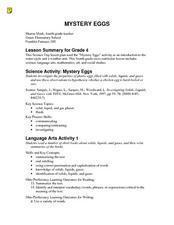Towson University
Mystery Disease
How did scientists determine the cause of illness before technology? Science scholars play the role of medical researcher in an engaging guided inquiry activity. Using observations, technical reading, and Punnett squares, learners...
National Science Teacher Association
Middle School Sampler: Science
Focus on inquiry-based learning in your science class with a series of activities designed for middle schoolers. A helpful packet samples four different texts, which include activities about predator-prey relationships, Earth's axis...
Edmond Public Schools
8th Grade Science Resource Book: Unit 2 - Physics
Get things moving with this extensive collection of physical science resources. Covering the fundamentals of measurement, graphing, lab safety, and experimental design as well as the specific scientific concepts...
NASA
Mystery Planet
What can one learn about a planet based on a small surface sample? Learners will explore artifacts from a mystery planet and see what they can determine about the planet based on the evidence in front of them.
National Wildlife Federation
Bison Mystery Box
Natural design is amazing. Young scientists connect the features of a bison to an assortment of everyday items. A bison's tail is an ideal flyswatter, and a pot stores water just like a bison's stomach. The instructional activity...
Curated OER
Mystery Marauders
Learners investigate plants with pest damage. In this plant life lesson, students study plants that have been damaged by insects. Learners try to discover which insects are causing the damage.
Baylor College
How Much Water Do Humans Need?
Physical or life science learners measure the amounts of water eliminated by intestines and the urinary system, and the amounts lost via respiration and perspiration. In doing so, they discover that the body's water must be replenished...
Montana Natural History Center
Studying Grassland Ecosystems
At first glance, grassland ecosystems might seem dull and uninteresting, but once you start to explore it's amazing the things you'll find! Through this series of engaging lessons, activities, and experiments, elementary students examine...
Science 4 Inquiry
The Ups and Downs of Populations
Life has its ups and downs ... especially if you're an animal! Biology scholars engage in a population study through an inquiry-based lesson. Pupils work together to explore the factors that affect deer populations, then examine the...
Curated OER
Sensational Science Fair Presentation
Students identify everyday mysteries for scientific investigation. They design and lead research into self-generated qeustions, form hypotheses, experiment and gather data, and process results. They then create visual displays of their...
Baylor College
Can Nutrients in Water Cause Harm?
Ecology candidates culture pond water organisms over a few days time, then they experiment to find out how increasing nutrients affects the population. As part of a unit on water, this exploration gives your class an understanding of how...
Baylor College
How Can We Find Out What Is in Water?
Using paper chromatography, water watchers discover that several substances might be dissolved even though they aren't visible. For this case, you will prepare a mixture of three different food colorings for them to experiment with. A...
Baylor College
What Dissolves in Water?
One of water's claims to fame is as the universal solvent. Young physical scientists experiment to discover which materials dissolve in this special compound. You could never be more prepared for teaching this lesson than by using this...
Baylor College
What Is the Water Cycle?
Small groups place sand and ice in a covered box, place the box in the sunlight, then observe as evaporation, condensation, and precipitation occur. These models serve as miniature water cycles and demonstrations of the three phases of...
Curated OER
Magnificent Microscopes Unit Including Mystery and Alternative Assessment Activity
After drawing and labelling a microscope, forensic science explorers use one to solve a simulated murder mystery. They examine each piece of evidence and draw what they observe at each magnification. Working in groups of four, your...
Curated OER
Mystery of the Megaplume
Read through the extensive background information and then lead your geology or physical oceanography class through an investigation of actual temperature anomaly data from the Juan de Fuca ridge. They translate the data onto a plot,...
Curated OER
Mystery Eggs
Students investigate the properties of plastic eggs filled with solids, liquids, and gases and use these observations to hypothesize whether a chicken egg is hard-boiled or raw.
Curated OER
Stonehenge: Solving Ancient Mysteries
Young scholars investigate the mystery of Stonehenge. In this Stonehenge lesson, students participate in a classroom activity that requires them to research information about Stonehenge as well as information regarding archeology and...
Curated OER
Confectionary Bureau of Investigations: Case of the Cookie Mystery
Students perform tests on different chemicals to determine their chemical properties. In this forensic science lesson, students identify an unknown sample using its physical and chemical properties. They solve a fictional crime using...
Curated OER
Mystery Boxes: Uncertainty and Collaboration
Students manipulate boxes with unknown internal structure and contents to become familiar with the concept of uncertainty in science.
Curated OER
Magnetic Mystery
Fourth graders investigate the poles of a magnet. In this magnet lesson, 4th graders explore what a magnet attracts and what it repels. Students view the N and S on magnets. students recognize that like poles repel and opposite...
Curated OER
A Hidden Beauty
Expose the beautiful mystery of bulbs as young botanists learn all about these fascinating plants. They glean information from a short text before observing actual bulbs (consider an onion), and comparing their findings with predictions....
Baylor College
How Do We Use Water?
Send youngsters home to survey how they use water in their homes. Then bring them together to discuss which uses are essential for our health and which are not. A helpful video offers teaching tips for this lesson, and a presentation...
Baylor College
What's That Food?
Get things cooking with the first lesson in this series on the science of food. Working in small groups, young scientists make and record observations about different mystery foods. These descriptions are then shared with the class and...

























